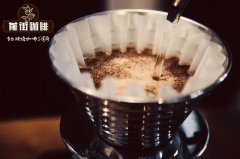What grade of coffee is there? a brief introduction to the classification system of coffee in various countries.

Professional coffee knowledge exchange more coffee bean information please follow the coffee workshop (Wechat official account cafe_style)
Introduction to Qianjie-Coffee Bean grading system
Overview of grading standards
One is the defect rate. The reviewers will randomly take 300 grams of raw beans from the raw beans that need to be graded, sort them manually, pick out impurities such as impurities such as unripe beans, moldy beans, broken beans, worm-eaten beans and pebbles, and grade them according to the number of pebbles singled out. The fewer defective beans are, the better the grade is.
However, there are different criteria for grading according to the defect rate, and the following three are usually used internationally:
American standard USP, namely US Preparation; European standard EP, namely Euro Preparation; extreme standard GP, namely Gourmet Preparation.
These standards are formed by defects and eye size, and sometimes there are additional criteria in them.
Generally speaking, USP/EP standard is relatively common, and EP standard is higher than USP standard.
The second is the size of beans. The evaluators used mechanical sieve for screening and grading. Generally speaking, in addition to special giant beans such as elephant beans, medium and small grains of coffee are more than 17 mesh for the best grade. For example, in the Blue Mountains of Jamaica, more than 17 orders are regarded as NO.1,16 orders and above NO.2,15 orders are regarded as NO.3. Mesh is the world's prevailing standard for particle size measurement, with a stroke of 64 inches as a mesh, about 0.4mm aperture. 17 mesh, that is, 17thumb 64 inches, about 6.75mm aperture.
The third is the altitude.
Some Central and South American countries use SHG (abbreviation for Strictly High Grown) to mark coffee beans, that is, high-altitude coffee beans, which are classified according to altitude, usually referring to coffee beans from highlands above 400m above sea level, such as Salvido and Honduras in Central America.
The fourth is the hardness of beans. At the same latitude and on the same plot, the higher the altitude, the greater the temperature difference between day and night, the longer the coffee growing period, the harder the beans, the more nutrients absorbed in the beans, the more obvious the flavor substances will be. There will be more raw beans. As a result, many coffee-producing countries in Central and South America south of Mexico use this as the standard. When these producing countries export raw beans, they have only one grade of SHB.
Special level Peaberry, abbreviated as PB. This is what we often call round beans. In Taiwan, Indonesia, Malaysia and other Chinese areas, this bean is also called a male bean. If you have to say that there is a distinction between male and female coffee beans, in fact, there is a certain basis, often PB will not germinate, can not be used as a seed, and normal flat beans can be used as seeds as long as they are handled correctly.
Knowledge: the coffee grading of most coffee-producing countries is not carried out according to one standard, but not only to examine the defect rate, but also to ensure the size of beans, but also to measure the grade of beans by multiple standards such as a certain altitude.
In short: Qianjie is a coffee research hall, happy to share the knowledge about coffee with you, we share unreservedly just to make more friends fall in love with coffee, and there will be three low-discount coffee activities every month. The reason is that Qianjie wants to make more friends drink the best coffee at the lowest price, which has been Qianjie's tenet for 6 years!
END
Important Notice :
前街咖啡 FrontStreet Coffee has moved to new addredd:
FrontStreet Coffee Address: 315,Donghua East Road,GuangZhou
Tel:020 38364473
- Prev

What do you mean coffee is treated with red honey? coffee honey is as sweet as honey when it is not sour.
Professional coffee knowledge exchange more coffee bean information please follow the coffee workshop (Wechat official account cafe_style) front street-coffee honey treatment introduction Costa Rica's high-quality coffee beans are called very hard beans (SHB), there are hard beans (GHB), slightly hard beans (SH) quality decline in turn, very hard beans grow above 1500 meters above sea level, altitude has always represented the quality of coffee
- Next

Is the coffee grade AA the best? Kenya coffee beans are graded strictly and the best quality is selected.
Professional coffee knowledge exchange more coffee bean information please follow the coffee workshop (Wechat official account cafe_style) front street-Kenya coffee bean grading system introduction Niya coffee bean grading standard I shared 2016coffeereview's TOP30 list mentioned before, Kenya has been on the list seven times, but also has been with its wonderful flower and fruit aroma and good sweetness and just right mellow
Related
- Beginners will see the "Coffee pull flower" guide!
- What is the difference between ice blog purified milk and ordinary milk coffee?
- Why is the Philippines the largest producer of crops in Liberia?
- For coffee extraction, should the fine powder be retained?
- How does extracted espresso fill pressed powder? How much strength does it take to press the powder?
- How to make jasmine cold extract coffee? Is the jasmine + latte good?
- Will this little toy really make the coffee taste better? How does Lily Drip affect coffee extraction?
- Will the action of slapping the filter cup also affect coffee extraction?
- What's the difference between powder-to-water ratio and powder-to-liquid ratio?
- What is the Ethiopian local species? What does it have to do with Heirloom native species?

